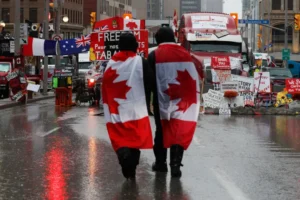An independent panel has determined that Justin Trudeau’s deployment of an emergency measure to disperse anti-vaccine protestors who had overtaken downtown Ottawa and stopped border crossings was justified.

The Public Order Emergency Commission’s report on the government’s decision to use the Emergencies Act in response to the so-called “Freedom Convoy” movement in February 2022 was presented to the Canadian parliament on Friday.
The ruling granted the government broad authority to disperse the protesters, including the right to forbid any public gathering “that may reasonably be expected to lead to a breach of the peace” and impose access restrictions on particular locations.
The panel’s commissioner, Paul Rouleau, a former justice of the Ontario appeals court, stated at a news conference in the nation’s capital, “After careful deliberation, I have found that the very high threshold required for the invocation of the Act was fulfilled.”
Rouleau claimed he arrived at his decision “with hesitation,” nonetheless.
In the much awaited report (PDF), he stated that “the state should normally be able to respond to conditions of urgency without the employment of emergency powers.” The report, which was more than 2,000 pages long, detailed a number of policing and administrative failings.
“While some of the errors may have been little, others were important, and when they were all combined, they helped to cause the situation to spiral out of control. According to the study, “lawful protest turned into lawlessness and culminated in a national emergency.
Civil rights advocates criticized Trudeau’s decision to use the Emergencies Act for the first time since it took effect in 1988 and questioned if Canada had complied with its stringent legal standards.
Rouleau nonetheless stated to reporters on Friday that the Cabinet had “sufficient grounds to believe that there existed a national emergency stemming from threats to the security of Canada that warranted the use of special, temporary measures” at the time the measure was deployed.
Participants in the “Freedom Convoy” gathered in Ottawa in late January 2022 to protest a vaccination requirement for truckers traveling across the US-Canada border. Additionally, the truckers and their supporters demanded that Trudeau resign and that all COVID-19 limitations be lifted.
For several weeks, protesters camped out in the city’s central business district, honking their horns and causing disruptions to daily life while others built blockades at Ontario and Alberta border crossings.
On February 14, 2022, days after Trudeau used the Emergencies Act, federal and provincial law enforcement authorities intervened to put an end to the blockades and the takeover of Ottawa. They detained numerous participants.
Late last year, the Public Order Emergency Commission heard testimony from dozens of witnesses during several days of open hearings. These witnesses included protest organizers, police officers, Trudeau, and other top government figures.
In his testimony in November, Trudeau stated that his administration had examined whether the “Freedom Convoy” represented a risk to Canada’s security and whether it was engaged in any activities that might result in “a severe threat of violence.”
Trudeau noted the appearance of guns at an Alberta border barricade, the use of children as “human shields” at another protest site, and the “weaponization” of vehicles in the convoy in saying, “There wasn’t a sense that things were dissipating.”
The prime minister stated in court that “we could not say that there was no potential for threats of serious violence, for serious violence to occur.” “Instead of things getting under control, we were witnessing things worsen.”
Rouleau stated on Friday that although the government had met the legal requirements to deploy the Act, “the situation that led to its implementation could certainly have been averted” had the police and other levels of government been better prepared for the convoy.
“There could have been a different response to this unprecedented situation,” the commissioner told reporters. “Had police forces and governments better anticipated and prepared for the extent of political and social discontent exacerbated by the COVID-19 pandemic – particularly in the environment of misinformation and disinformation so prevalent today – and had they collaborated more effectively.
The public investigation on its use was required by the Emergencies Act itself.
The War Measures Act, which was used in 1970 in response to a surge of violence by hardline Quebec separatists, was criticized, leading to the creation of that clause. The War Measures Act received a lot of flak for violating people’s civil freedoms.




